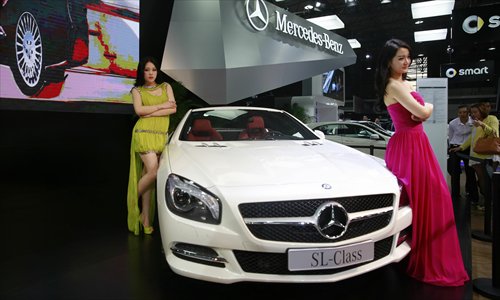HOME >> BUSINESS
Foreign auto giants to be punished: NDRC
By Cathy Wong Source:Global Times Published: 2014-8-7 0:28:01
12 Japanese car firms implicated in antitrust probe with Audi, Chrysler

Two models pose next to a Mercedes-Benz car at an auto show in Nanchang, East China’s Jiangxi Province, on May 1. Photo: CFP
China's top economic planner announced Wednesday it will punish two foreign auto giants for monopolistic practices, and added it expects 12 Japanese companies to also be punished for breaking the anti-monopoly law.
Li Pumin, spokesperson for the National Development and Reform Commission (NDRC) announced at a press conference Wednesday that Chrysler and Audi were found to have engaged in monopolistic behaviors and will be punished accordingly in the near future.
Chrysler was investigated by the Shanghai Municipal Development and Reform Commission and Audi by the Hubei Province Price Bureau, said Li.
He also said a separate antitrust investigation into 12 Japanese companies has been completed, and they will be punished in accordance with the law for monopoly pricing of auto components and bearings.
Li declined to name the 12 companies, but said further details will be announced soon.
In a statement sent to the Global Times on Wednesday, Chrysler restates that it has since Tuesday reduced the price of its top of the line Jeep Grand Cherokee SRT8 model by 65,000 yuan ($10,500) and its Grand Cherokee 5.7-liter Summit by 45,000 yuan. It will also cut by 20 percent the price of 145 spare parts, including headlights, mirrors and starters.
Audi did not respond to requests for comment as of press time on Wednesday.
Li also confirmed that the Jiangsu Province Price Bureau separately launched an antitrust probe last week into Daimler AG's Mercedes-Benz dealers in five Jiangsu cities, and the authorities are now collecting evidence.
Antitrust investigators reportedly raided the German automaker's Shanghai premises on Monday, interviewing top executives and confiscating computers.
The NDRC launched anti-monopoly probes into the auto sector at the end of 2011 to push for fairer competition and protect customer rights.
"The authorities' antitrust probe is reaching a much wider and deeper level now," Cui Dongshu, deputy secretary-general of the National Passenger Car Association, told the Global Times, noting that the recent investigations target not only car makers but also spare-part makers.
According to the Anti-Monopoly Law of China, enterprises which have been involved in monopolistic practices may be fined between 1 and 10 percent of their total sales from the previous year.
Cui expects the 12 Japanese auto makers will receive harsher punishments than the other firms being investigated due to their more severe monopolistic practices and much stronger market dominance.
"Japanese companies in China are closely connected and are prone to price fixing among sellers," said Cui. "The unlawful gains will be transferred back to Japan and cause losses to the Chinese market."
"Japanese companies have penetrated deeply into China's spare-part market due to their strong technological advantage in the field as well as their collusion in horizontal price restraints," noted Cui.
According to a report released Tuesday by rating agency Fitch, the top three Japanese automakers, Toyota, Honda and Nissan continue to enjoy robust volume growth in China, regaining some of the market share lost following a diplomatic dispute over the Diaoyu Islands in September 2012.
Among the three, Nissan's sales volume in China went up by 14 percent, increasing its market share to near 6 percent.
Posted in: Industries